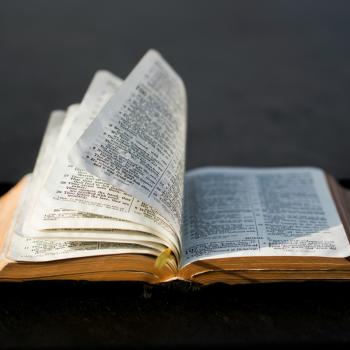
“Is there a God?” This may be one of the world’s most frequently asked questions. I’ve heard it from people who are religious and non-religious, educated and uneducated, rich and poor, young and old. I’ve heard it in private and in public.
It is articulated with great intensity by sincere seekers of truth, but it has been demeaned to the level of a joke by cynical comedians. One way or another, everyone seems to take a turn asking this question of all questions.
Some answer with an emphatic yes, others with an equally emphatic no. Many waver with the occasion while some claim it doesn’t even matter. But it does.
Our response affects what we believe about life here and now as well as life in the hereafter. It affects how we value and interact with other people, but also how we see our own potential, our ability to make positive changes, and our motives for even trying.
Debating God's Existence
Faithful Christians provide evidence for God’s existence—the scriptures, the wonders of creation, the upward yearnings they feel, the miraculous conversions, and the answers to prayer they have received.
The faithless counter with their own evidence. They claim scriptures are myths and fables, creation results from big bangs and natural selection, and upward impulses are self-delusion or prelingual memories. Answers to prayer are nothing more than self-fulfilling prophecy, coincidence, or fate.
The faithful ask, “What about conscience, our inborn moral compass?” The faithless declare that conscience is merely the product of social conditioning. The faithful ask, “What about our tendency to experience guilt and our ability to differentiate between regret for mistakes and remorse for sin?” The faithless respond that these are merely the result of indoctrination.
Back and forth rages the debate, with each round becoming more and more intense. Advocates on both sides demand tolerance for their own viewpoints, but offer little tolerance for the viewpoints of others.
Concerned observers ask what ultimately determines an individual’s choice. Surely it varies, as each must make his or her own decision. But one piece of evidence that has been crucial for me as I step back and consider the options is that I can step back and consider the options.
To me the very possibility for debate is strong evidence that a supreme being does exist—one who has created us in His image and allows us to reason and make choices as He does. I don’t see plants and animals having discussions about whether or not God exists. Simply being complex enough to consider both possibilities sets humans apart.
Can evolution alone truly account for our complexity and unpredictability? Human abilities and potential cannot be reduced to anything that natural selection alone would have called for.
Consider how profoundly we can love, how openly we can cry, how boisterously we can laugh, how deeply we can hurt, and how boundlessly we can feel joy.
In addition to feeling these strong emotions for ourselves, we experience empathy that allows us to feel these same emotions on behalf of others. We can feel grief at another’s suffering; we can feel joy at another’s success. This common humanity goes far beyond self-awareness and survival of the fittest.
As humans, not only can we separate our actions from ourselves, but we can also reflect on them. What animal can say “such behavior wasn’t like me”? What animal is capable of honest introspection? We are different because we can conceive of a better version of ourselves. What animal can redefine itself in this way?
Questions Beyond the Debate
We can step outside ourselves and consider questions that go far beyond the bounds of our own life experiences. At times we can ponder such questions with fleeting curiosity. At other times we can literally ache to learn and to know. How many chemical reactions make meaning as they take place? This ability seems evidence enough for me to choose to believe there is a God.
Others may come to the same conclusion and believe in God’s existence, but our search for understanding does not stop with this decision. What evidence do we have that God does anything more than exist?
A supreme being could exist and be completely apathetic, distant, and cold. We could just be a few more of His creations about which He has no concern. Perhaps God may even be selfish and cruel. What evidence do we have that God is not a tyrant who delights in torturing us?
Certainly many who have experienced trials and heartaches have questioned God’s love. Once again, one of the decision factors for me as I consider God’s attributes is that I have multiple options and the opportunity to choose. My freedom to choose seems an assurance that God is benevolent, caring, and concerned.
My friend Wendy Ulrich wrote, “Faith is a choice we make amid alternatives, not what is left over after all competing worldviews have been neatly eliminated” (“The Temple Experience: Passage to Healing and Holiness,” p. 178). Consider how evenly the evidence of God’s existence or non-existence is displayed. To me, that distribution says something about God’s character.
It appears He doesn’t want to manipulate the evidence unfairly in either direction—not because He is apathetic about what I believe, but because He wants me to be completely free to make my own choice.
Freedom brings with it great risks and the possibility of pain, but it is absolutely necessary for progress, fulfillment, and lasting joy. Because God wants us to be happy, He desires us to believe in Him. But if the evidence were too clearly in His favor, I would be “forced” to accept it as I am “forced” to accept the law of gravity.
Find the Answer By Faith
To me, one of the clearest evidences of God’s goodness is that He does not prove Himself to us beyond all possibility of doubt. The fact that He allows compelling evidence on both sides of the argument of His existence preserves and honors my freedom.
Growth and happiness are totally dependent on my choices, and since God allows me freedom to choose, I can conclude that He desires my growth and happiness. He may ultimately want me to believe, but more importantly, it appears He wants me to want to believe.
Terryl and Fiona Givens wrote, “There must be grounds for doubt as well as belief, in order to render the choice more truly a choice. . . . When faith is a freely chosen gesture, it expresses something essential about the self” (“The God Who Weeps,” p. 4-5).
While everyone argues for his or her side in the debate about God’s existence, the fact that there are two sides and the freedom to choose between them makes a difference to me.
I choose to believe that God exists and that He cares because He obviously values my freedom enough to let me make that choice and live with the consequences.
He wins my devotion, praise, and worship precisely because He refuses to force me to make these offerings. This understanding helps me be a Christian—not just on Sunday but seven days a week.
Excerpt from “The 7-day Christian” by Brad Wilcox.
10/19/2021 10:27:17 PM





